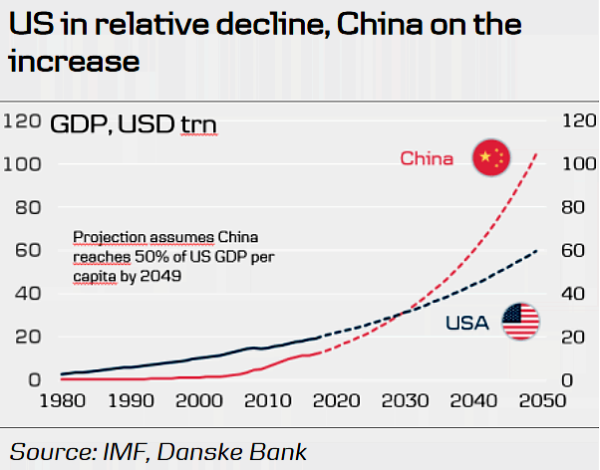|
Getting your Trinity Audio player ready...
|
We hear all the time that our country is “deeply divided.” And in many ways that’s true; the Red/Blue split is growing—it begins in Washington DC but doesn’t end there. It’s hard to see how it will be resolved peacefully. Yet there is one thing that Washington agrees on: a neoconservative foreign policy.
Whether it’s Hilary Clinton or Mitt Romney, Joe Biden or Lindsey Graham, the DC establishment gives unquestioning support to a bellicose “unipolar” foreign policy in which the United States controls the world by military and economic might.
Any disagreement with this outlook is quickly labeled treasonous (see Rand Paul or Tulsi Gabbard); apparently, straying from the neocon narrative means you support America’s enemies. This has been the case since at least the end of the Cold War 30 years ago, and we’ve seen it most recently with the Russia-Ukraine conflict.
Orthodox. Faithful. Free.
Sign up to get Crisis articles delivered to your inbox daily
While an increasing number of conservatives are questioning the neocon narrative when it comes to the conflict in Ukraine, there’s one area where even “America First” conservatives endorse a combative outlook: China. While an increasing number of conservatives are questioning the neocon narrative when it comes to the conflict in Ukraine, there’s one area where even “America First” conservatives endorse a combative outlook: China.Tweet This
Now, to be clear: the ruling China Communist Party (CCP) is evil, period. The list of its human rights violations would run from here to, well, China. What the CCP does to its own citizens is horrific (and, as an aside, the Vatican’s cozying up to the CCP is disgraceful). To pretend the CCP is anything but a repressive and totalitarian regime is absurd. But the question remains: is China a military threat to the United States? More specifically, is China an actual threat to invade the United States?
Too often conservatives conflate the internal policies of the CCP with a threat to the United States, so they support a belligerent attitude when it comes to China (an attitude fully in line with the Biden Administration, by the way). However, many countries around the world have repressive governments (for example, American ally Saudi Arabia). Do we automatically consider them a threat to the United States? No, because a government can be evil internally without desiring to take over America.
The common assumption among both neocons and more traditional conservatives is that the weaker America gets, the more we leave ourselves open to invasion by another country. That might be true theoretically, but practically it’s hard to imagine. The United States is a vast nation, protected by massive oceans on either side. While it might be possible to invade a city like New York or Los Angeles, controlling the boundless regions in the middle of the country would be nearly impossible—imagine trying to take over the country town by town, ranch by ranch (and I don’t think Texans would be too willing to lay down their guns for foreign invaders).
Further—and this is something many Americans don’t want to accept—the CCP has not shown a propensity to expand through military conquest. Other than Taiwan—which has a complex history—in 70+ years of CCP rule, China has been very reserved about getting into foreign conflicts (the same can certainly not be said of the United States in that time period). And China’s designs on Taiwan are not, in spite of what you’ll hear from the perpetual warmonger machine in Washington, a first step toward their invasion of America. The idea that making claims on a neighboring island with a disputed history is a sure path to conquering a superpower on the other side of the globe is ludicrous.
So the idea of a land invasion—from China or really any country—should be dismissed as the stuff of Hollywood movies and fevered neocon fantasies. But what about a nuclear attack? After all, China does possess a significant nuclear arsenal.
Again, for all its evils, the CCP does not seem to have an appetite for military expansion and interventionism. More importantly, how would it benefit China to nuke the United States? America is China’s top trading partner, with exports far exceeding imports (as of 2018, exports to America made up 65% of China’s trade balance surplus). Getting into a nuclear war with America would be economically suicidal on China’s part, even beyond the death and destruction of the nukes themselves.
So why do so many American foreign policy experts consider China to be America’s biggest threat today? Because it is a threat—not militarily, but to America’s global economic hegemony. Since the end of the Cold War, the United States has been the world’s unquestioned economic leader, with the US dollar as the world’s reserve currency, and the Washington/Wall Street crony-capitalistic alliance setting the tone for global markets. However, this hegemony is starting to show signs of weakness.
Look at the chart below. China’s GDP has been steadily increasing compared to US GDP. By 2030, China’s GDP is projected to pass America’s.

Further, in the 1990’s the U.S. and its Western Allies controlled 70% of world GDP; that number is now 43%. Whether we like it or not, America’s days as the sole economic superpower are coming to an end.
And that is what really concerns the Biden Administration and the Washington establishment—not human rights violations, not potential military invasions. It’s America’s economic standing that drives DC neocons to belligerently treat China as America’s Asian boogeyman.
We have to ask ourselves: is world economic domination worth antagonizing China? Why must the United States have to be the only economic power in the world? As America’s economic light inevitably dims on the world stage, are we willing to risk starting a war to keep clinging to our unipolar position?
This is not to say we shouldn’t respond to China’s growth and our decline; quite the contrary. The way to stay ahead of China isn’t to try to knock it down or pick a fight, but instead to raise ourselves up. We need to grow our economy and lessen our dependence on China. We need to make our markets more free and less burdened by excessive government regulation. We need to have more manufacturing here in the United States (which can only happen through less regulation).
By this author:
-
Deadly IndifferenceProduct on sale$9.95 – $10.00
The DC establishment wants to take a Tonya Harding approach to foreign policy—instead of improving ourselves, we kneecap any competition that might be in our way. This path will ultimately lead to suffering and even death for many, and it doesn’t make our own economy grow (other than the military-industrial complex, of course). Our focus should be on building up our own country rather than creating military enemies out of any potential economic competitor.
The China Communist Party is, without question, awful. Hopefully one day it will be overthrown and a freer government put in its place. (And perhaps that will happen sooner rather than later.) But it’s not America’s duty to make that happen. It’s also not America’s sacred role that we absolutely must be the world’s sole economic superpower. Let’s stop creating military enemies for economic reasons, and instead focus on defending our own freedom and building up our own economy.

